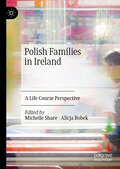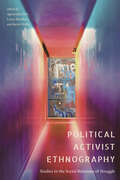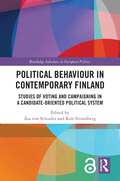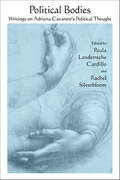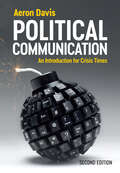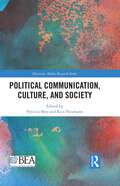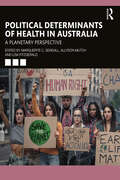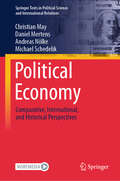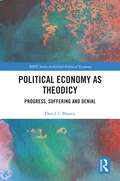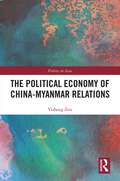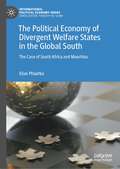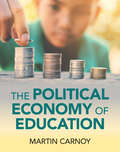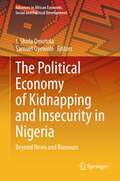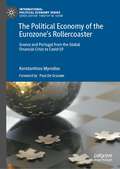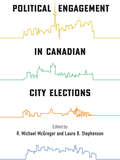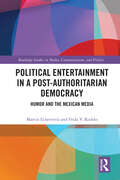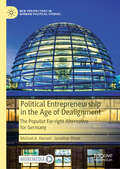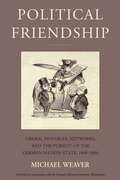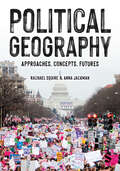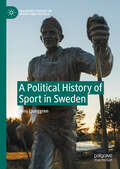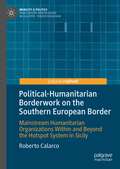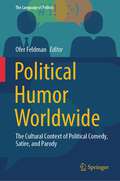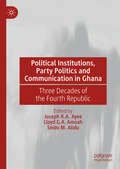- Table View
- List View
Polish Families in Ireland: A Life Course Perspective
by Alicja Bobek Michelle ShareThis volume explores the family formation and life course of Polish people in Ireland, who make up the largest immigrant group in Ireland. Chapters address key dimensions of the life course in three parts focusing on childhood and youth, adulthood and parenting, and mid-life and futures. Contributions investigate the experiences of children and youth attending school and understanding their identities, the changing nature of families and family support, how families might engage with welfare institutions, and more. Through the life course approach, the book moves beyond the paradigm of studying the Polish population as economic migrants and instead analyzes and illustrates the lives of Polish families living in Ireland since EU enlargement.
Political Activist Ethnography: Studies in the Social Relations of Struggle
by Agnieszka Doll Laura Bisaillon Kevin WalbyAs activists strategize, build resistance, and foster solidarity, they also call for better dialogue between researchers and movements and for research that can aid their causes. In this volume, contributors examine how research can produce knowledge for social transformation by using political activist ethnography, a unique social research strategy that uses political confrontation as a resource and focuses on moments and spaces of direct struggle to reveal how ruling regimes are organized so activists and social movements can fight them. Featuring research from Aotearoa (New Zealand), Bangladesh, Canada, Poland, South Africa, and the United States on matters as diverse as anti-poverty organizing, prisoners' re-entry, anti-fracking campaigns, left-inspired think-tank development, non-governmental partnerships, involuntary psychiatric admission, and perils of immigration medical examination, contributors to this volume adopt a “bottom-up” approach to inquiry to produce knowledge for activists, not about them. A must-read for humanities and social sciences scholars keen on assisting activists and advancing social change.
Political Behaviour in Contemporary Finland: Studies of Voting and Campaigning in a Candidate-Oriented Political System (ISSN)
by Åsa Von Schoultz Kim StrandbergThis book presents a comprehensive overview of Finnish electoral democracy, expertly detailing both its typical representation of a stable European party democracy and its particularities such as a personalized electoral system, a fragmented party system with tradition of grand government coalitions and its sensitive geopolitical location.Using the Finnish National Election Study as a basis, it analyses how voters act and react in an electoral democracy characterized by a high degree of competition between and within parties, yet a democracy in which the possibility for voters to hold governments accountable for their actions is weak, leading to interesting tensions within the system and influences on how voters relate to and engage in politics. This book not only describes these patterns but also provides the reader with thorough explanations and interpretations from a team of expert contributors.This book will be of key interest to scholars and students of Finnish politics, Nordic/Scandinavian politics and studies, political behaviour, electoral studies, public opinion and more broadly to comparative politics and democracy.
Political Bodies: Writings on Adriana Cavarero's Political Thought (SUNY series in Contemporary Italian Philosophy)
by Paula Landerreche Cardillo; Rachel SilverbloomAdriana Cavarero has been, and continues to be, one of the most innovative and influential voices in Italian political and feminist thought of the last forty years. Known widely for her challenges to the male-dominated canon of political philosophy (and philosophy more broadly construed), Cavarero has offered provocative accounts of what constitutes the political, with an emphasis on embodiment, singularity, and relationality. Political Bodies gathers some of today’s most prominent and well-established theorists, along with emerging scholars, to contribute their insights, questions, and concerns about Cavarero's political philosophy and to put her work in conversation with other feminist thinkers, political theorists, queer theorists, and thinkers of race and coloniality. A new essay by Adriana Cavarero herself closes out the volume. Political Bodies ventures beyond the familiar boundaries of Cavarero's own writing and is a testament to the generative encounters that her philosophy makes possible.
Political Communication: An Introduction for Crisis Times (Communication And Society Ser.)
by Aeron DavisWe are living in a period of great uncertainty. The rise of extreme populists, economic shocks and rising international tensions is not only causing turmoil but is also a sign that many long-predicted tipping points in media and politics have now been reached. Such changes have worrying implications for democracies everywhere.This second edition of Political Communication bridges old and new to map the political and cultural shifts and analyse what they mean for our ageing democracies. With new sections and revisions to all chapters, the book continues both to introduce and challenge the established literature. It revisits key questions such as: Why are polarized electorates no longer prepared to support established political parties? Why are large parts of the legacy media either dying or dismissed as 'fake news'? And why do some democratic leaders look more like dictators? In this fully updated edition, there is greater focus on digital developments, and it is enriched with new global comparisons and useful ancillary material.Political Communication: An Introduction for Crisis Times will appeal to advanced students and scholars of political communication, as well as anyone trying to understand the precarious state of today's media and political landscape.
Political Communication, Culture, and Society (Electronic Media Research Series)
by Patricia Moy Rico NeumannAs an installment of Routledge’s Broadcast Education Association (BEA) Electronic Media Research Series, Political Communication, Culture, and Society focuses on the expansive concept of political communication and illuminates the processes, contents, and effects related to myriad forms and vehicles of political communication. Whether involving traditional print or broadcast media, social media platforms, or face-to-face discussions, political communication today has shaped how we perceive others and understand the world around us, including our place in it, and ultimately, how we engage with others as social, cultural, and political beings. Hailing from multiple locations and drawing on a multitude of theories as well as quantitative and qualitative methodologies, the volume’s contributors examine how communication intersects with politics in a broad swath of contexts, ranging from climate change to migration to the notion of political correctness. Collectively they ask and answer questions about how today’s richly textured media ecology shapes our political world and how political messages can fuel – and ameliorate – the issues that deeply cleave societies around the globe. Relevant to scholars and students of journalism, media studies, and communication sciences, this volume will help interested readers better understand today’s increasingly complex sociocultural world through the lens of political communication
Political Communication, Culture, and Society (ISSN)
by Patricia Moy Rico NeumannAs an installment of Routledge’s Broadcast Education Association (BEA) Electronic Media Research Series, Political Communication, Culture, and Society focuses on the expansive concept of political communication and illuminates the processes, contents, and effects related to myriad forms and vehicles of political communication. Whether involving traditional print or broadcast media, social media platforms, or face-to-face discussions, political communication today has shaped how we perceive others and understand the world around us, including our place in it, and ultimately, how we engage with others as social, cultural, and political beings.Hailing from multiple locations and drawing on a multitude of theories as well as quantitative and qualitative methodologies, the volume’s contributors examine how communication intersects with politics in a broad swath of contexts, ranging from climate change to migration to the notion of political correctness. Collectively they ask and answer questions about how today’s richly textured media ecology shapes our political world and how political messages can fuel – and ameliorate – the issues that deeply cleave societies around the globe.Relevant to scholars and students of journalism, media studies, and communication sciences, this volume will help interested readers better understand today’s increasingly complex sociocultural world through the lens of political communication.
Political Determinants of Health in Australia: A Planetary Perspective
by Marguerite C. Sendall Allyson Mutch Lisa FitzgeraldExposing the explicit and implicit relationships between politics, political decisions, and public policy within a planetary perspective, this book focuses on the importance of the political environment as a determinant of population health outcomes.Political Determinants of Health in Australia brings together a team of experts in public health, health policy and planetary health in Australia to examine the political factors that determine population health outcomes. It takes a student-centred approach, explaining complex concepts in an interactive, engaging, and thought-provoking way within a logical, easy to navigate structure. Each chapter takes on key contemporary public health issues, such as family, work, diversity, housing, energy, education, food, and waste, examining it within the context of politics, policy, and health outcomes from a planetary perspective.There is a comprehensive suite of learning activities in each chapter, catering to diverse learning styles and prior knowledge to encourage critical thinking. An essential text for students of public health, health promotion, and health policy.
Political Economy: Comparative, International, and Historical Perspectives (Springer Texts in Political Science and International Relations)
by Christian May Daniel Mertens Andreas Nölke Michael SchedelikThis textbook offers a comprehensive introduction to Political Economy. It combines comparative,international and historical perspectives into a holistic framework of analysis. Drawing on the workof Karl Polanyi, the book shows how capitalist economies differ around the globe and how they areembedded in the international economic order. Through a critical-institutionalist lens, it helps toaccount for the evolution of contemporary capitalism and addresses current topics at the intersection of political science and economics.Students and instructors can draw on supplementary material, such as Power Point slides withall figures and tables as well as the Springer Nature Flashcards app with exercises.
Political Economy as Theodicy: Progress, Suffering and Denial (ISSN)
by David L. BlaneyPolitical Economy as Theodicy: Progress, Suffering and Denial proposes that political economics operates within a theological symbolic order that dictates modern sociopolitical and economic life as a whole.This book revisits the work of key figures in the history of political economy and economic thought – primarily Adam Smith, Bernard Mandeville, David Hume, Thomas Malthus, W. Stanley Jevons, Alfred Marshall and John Bates Clark. Theodicy is a constitutive element of an international political economy (IPE) that often disavows moral evil, while it conversely redefines such evil as an actual good within economic life. Beginning with the Enlightenment thinkers and continuing through to the modern neoclasscial economists, this book traces the initial emergence of a natural theological basis for political economic thinking and concludes with a discussion of its application in modern IPE. Relying upon a postcolonial framework, the author seeks to provincialize economics, creating space for alternative modes of being and doing.This book will appeal to scholars and advanced students of IPE, political theology, international relations and postcolonial studies.
The Political Economy of China-Myanmar Relations (Politics in Asia)
by Yizheng ZouThe Political Economy of China-Myanmar Relations is a comprehensive guide that seeks to fill the gap in research on China-Myanmar relations. This book provides readers with a deeper understanding of the long-term continuity of China-Myanmar relations, which has yet to be fully explored by the academic community. The Political Economy of China-Myanmar Relations covers a wide range of topics related to the bilateral relationship between China and Myanmar. The book offers an in-depth analysis of Chinese investment and aid in Myanmar's economy, including infrastructure projects. It also explores how Chinese investment has impacted Myanmar's society and environment. In addition to economic issues, Zou also examines political developments in Myanmar, including the peace process with ethnic armed groups and democratic reforms. The way China's interests intersect with these developments and how it has influenced Myanmar's domestic politics is analyzed, and the role of other major powers such as India, Japan, and the US in shaping China-Myanmar relations is discussed. This book is particularly useful for scholars and researchers interested in understanding the complex dynamics of China-Myanmar relations. Policymakers and business leaders will also find this book valuable as it offers practical insights into how China's growing influence is shaping Myanmar's political and economic landscape.
The Political Economy of Divergent Welfare States in the Global South: The Case of South Africa and Mauritius (International Political Economy Series)
by Elias PhaahlaThis study traces the welfare regimes of Mauritius and South Africa from the early 20th century focusing on the historical circumstances that gave rise to the dominance of state-funded old-age pensions within their respective welfare frameworks. It highlights intersections between powerful business interests, the state, and social forces that sowed the seeds of social entitlements. Due to different mobilisation efforts of these social actors, both countries have spawned welfare regimes of different persuasions. Mauritius has maintained its long-standing traditions as a social democracy stretching back to the late 1950s, while South Africa continues relentlessly in pursuit of a liberal welfare state, a journey it has treaded since 1928 when the old-age pension laws first came into effect. While unravelling the innermost workings of welfare state development in Mauritius and South Africa, it also probes the present political and economic circumstances that have kept these two welfare regimes resolutely unchanged. Against this backdrop, it draws parallels between current welfare outcomes and those of old as they continue to chart their way into the future.
The Political Economy of Education
by null Martin CarnoyThe Political Economy of Education provides academically rigorous yet clear explanations of the economics and politics driving today's educational systems and how economists analyze them. The book covers a host of topics central to teaching about education and crucial to educational policy. These include how to use the tools of economic and political theory to take critical measure of education's role in social mobility and economic growth, whether good teachers can overcome social class and race achievement gaps, the effectiveness of early childhood and vocational education, and debates on school accountability and whether increasing spending on schooling improves quality. The book also explores worldwide changes in higher education, especially massification and increased stratification and privatization. Written for upper undergraduate and graduate students in economics, public policy, and education and packed with real-world examples, this is an essential text for anyone interested in gaining fresh and international perspectives on education.
The Political Economy of Kidnapping and Insecurity in Nigeria: Beyond News and Rumours (Advances in African Economic, Social and Political Development)
by J. Shola Omotola Samuel OyewoleProviding unique perspectives on one of the leading hotspots of kidnapping in the world, this book examines the political and socioeconomic dimensions of the causes, manifestations, and consequences of kidnapping in Nigeria, as well as some of the control measures that have been adopted at different levels of governance and their effectiveness. The topics covered in the volume include details on the framework of understanding kidnapping, the evolution of kidnapping from pre-colonial to post-colonial eras, and the relationship between ungoverned spaces and kidnapping in the country. The book further sheds light on kidnapping in the context of insurgent campaigns, with insights into oil-related militancy in the Niger Delta region, with the Islamist Boko Haram insurgency and terrorism in the Northern region of Nigeria. It discusses non-insurgent kidnapping, situating kidnapping in the contexts of banditry, ransoming, ritualism, baby factory, and human trafficking. Additionally,the volume analyses the emerging gender and transnational frontiers of kidnapping in Nigeria. Expanding the discussion on state responses, this book also looks into responses of non-state actors to kidnapping as well as negotiations in hostage crisis management. Finally, it examines other unique subjects, such as media coverage of kidnapping, and the consequences for Nigeria’s international image. The book will appeal to students, scholars, and researchers of political science, international relations, economics, sociology, history, law and business management in general, as well as African studies, security studies, criminology, peace and conflict studies, and geography and area studies. It will also be helpful for public policy-makers, African security experts and professionals, as well as business managers, risk analysists and insurance industry that are interested in a better understanding of kidnapping and associated political, social, economic, and security dynamicsin Nigeria and beyond.
The Political Economy of the Eurozone’s Rollercoaster: Greece and Portugal from the Global Financial Crisis to Covid-19 (International Political Economy Series)
by Konstantinos MyrodiasGlobal crises throughout history have shaken humanity and transformed economies and societies. The Eurozone faced two such crises soon after its foundation. This book brings new insights regarding the Eurozone’s response to the Global Financial Crisis in 2008 and the Covid-19 pandemic and its effectiveness in dealing with the macroeconomic imbalances in Europe. Is the Eurozone more resilient now? This book is an indispensable addition to the literature on the recent global crises and the Eurozone for both academics and policymakers who are eager to delve deeper into these vital questions.
Political Engagement in Canadian City Elections (McGill-Queen's Studies in Urban Governance)
by R. Michael Mcgregor and Laura B. StephensonMunicipal elections in Canada don’t look much like those held at the federal and provincial levels. A key difference is a significant discrepancy in voter turnout, but relatively little is known about why far fewer people vote in city elections.Voters show less interest in local government, seeing it as less influential than other levels, yet they believe their views matter more to local politicians. Political Engagement in Canadian City Elections explores this apparent contradiction by asking who participates in politics, how they go about it, and why. Drawing from the Canadian Municipal Election Study, a novel survey of electors in eight large cities across the country in 2017 and 2018, contributors consider factors ranging from the universal – such as the demographic profile of voters or how economic conditions affect them – to the specific – for example, participation in school board and council elections.There are more municipal elections than any other kind in Canada. The discoveries in Political Engagement in Canadian City Elections collectively represent a major leap forward in our understanding of voter activity at the community and municipal level.
Political Entertainment in a Post-Authoritarian Democracy: Humor and the Mexican Media (Routledge Studies in Media, Communication, and Politics)
by Martin Echeverria Frida V. RodeloThe book offers an analytical and empirical account of the specificities of political entertainment in post-authoritarian democracies. Centered around Mexico as a case study, the book explores the production of political entertainment in post-authoritarian legacy media and how political and economic conditions constrain the range and edge of discourse; how political entertainment in social media is shaped by the structure of platforms, as creators are encouraged to conform to specific norms such as constant publication; and the impacts of these media on attitude formation among the population. The book proposes a theoretical framework for identifying the specific conditions of post-authoritarian democracies that constrain the production of political entertainment, as well as its outcomes in terms of content and effects. This framework can be applied to the analysis of similar case studies, particularly in the Global South at large. With an analysis drawing on hard data, historical accounts, and anecdotal evidence, this volume will resonate within academic communities interested in political communication, media studies, transitional democracies, and popular culture.
Political Entrepreneurship in the Age of Dealignment: The Populist Far-right Alternative for Germany (New Perspectives in German Political Studies)
by Michael A. Hansen Jonathan OlsenThis book traces the rise of the far-right Alternative for Germany (AfD) from its inception in 2013 to its re-election to the Bundestag in 2021, emphasising the party’s nature as a “populist issue entrepreneur” and covering the three major crises that have shaken European party politics – the Eurozone crisis, the so-called refugee crisis and the COVID pandemic. Currently, books on the AfD are largely limited to historical accounts and surface-level analyses of the party. This volume is both empirically rigorous and conceptually nuanced: it seeks to understand the party’s political trajectory and its appeal to its supporters by using advanced quantitative methodologies to analyse voter behaviour, as well as by interpreting the party’s communication strategies through mixed empirical methods. It embeds this account within a well-grounded theoretical argument. The argument emphasises three important explanatory conditions – a favourable political opportunity structure, issue entrepreneurship, and the party’s stages of political development.
Political Friendship: Liberal Notables, Networks, and the Pursuit of the German Nation State, 1848-1866 (Studies in German History #29)
by Michael WeaverBetween periods of revolution, state repression, and war across Central and Western Europe from the 1840s through the 1860s, German liberals practiced politics beyond the more well-defined realms of voluntary associations, state legislatures, and burgeoning political parties. Political Friendship approaches 19th century German history’s trajectory to unification through the lens of academics, journalists, and artists who formed close personal relationships with one another and with powerful state leaders. Michael Weaver argues that German liberals thought with their friends by demonstrating the previously neglected aspects of political friendship were central to German political culture.
Political Geography: Approaches, Concepts, Futures
by Rachael Squire Anna JackmanThis innovative and thought-provoking text will teach you about the diverse and increasingly expansive sub-discipline of geopolitics. Divided into three sections, Political Geography draws on case studies from a diverse range of scales, contexts, and demographics, to introduce you to the key approaches, concepts, and futures of geopolitics. You will cover an extensive range of key topics in Political Geography, from feminist geopolitics to non-human worlds, and nationalism to peace and resistance. Throughout this first edition you will apply various theoretical lenses, utilise a wide range of examples both past and present, and draw on cutting edge scholarship to reinvigorate your understanding of important themes such as the state, borders, and territory. Based on the award-winning course at RHUL, Politcal Geography includes a variety of sites, spaces, materials, and images alongside ‘In the field’ tips, ideas for practical dissertation research, and tasks to facilitate active follow-on learning. Case studies, key terms, key questions and learning exercises, and annotated readings are included throughout every chapter to aid understanding and help you to engage and reflect on the content. Designed as a core text for undergraduates and an introductory text for postgraduates with an interest in Political Geography. Rachael Squire is lecturer in Human Geography at Royal Holloway University of London Anna Jackman is lecturer in Human Geography at University of Reading
Political Geography: Approaches, Concepts, Futures
by Rachael Squire Anna JackmanThis innovative and thought-provoking text will teach you about the diverse and increasingly expansive sub-discipline of geopolitics. Divided into three sections, Political Geography draws on case studies from a diverse range of scales, contexts, and demographics, to introduce you to the key approaches, concepts, and futures of geopolitics. You will cover an extensive range of key topics in Political Geography, from feminist geopolitics to non-human worlds, and nationalism to peace and resistance. Throughout this first edition you will apply various theoretical lenses, utilise a wide range of examples both past and present, and draw on cutting edge scholarship to reinvigorate your understanding of important themes such as the state, borders, and territory. Based on the award-winning course at RHUL, Politcal Geography includes a variety of sites, spaces, materials, and images alongside ‘In the field’ tips, ideas for practical dissertation research, and tasks to facilitate active follow-on learning. Case studies, key terms, key questions and learning exercises, and annotated readings are included throughout every chapter to aid understanding and help you to engage and reflect on the content. Designed as a core text for undergraduates and an introductory text for postgraduates with an interest in Political Geography. Rachael Squire is lecturer in Human Geography at Royal Holloway University of London Anna Jackman is lecturer in Human Geography at University of Reading
A Political History of Sport in Sweden (Palgrave Studies in Sport and Politics)
by Jens LjunggrenThis book presents a history of Swedish sport, highlighting in particular the relationship between sport politics and people’s changing attitudes towards sport from the eighteenth century until today. It scrutinizes the interaction between sport politics and people’s different approaches to sport in everyday life. By investigating how different ways of pursuing and conceptualizing sport have progressed and interacted, and how they have influenced as well been influenced by sport politics, this book discerns the role of both governmental and municipal politics in the development of sport in Sweden.
Political-Humanitarian Borderwork on the Southern European Border: Mainstream Humanitarian Organizations Within and Beyond the Hotspot System in Sicily (Mobility & Politics)
by Roberto CalarcoThis book focuses on the role mainstream humanitarian organizations have in the functioning of the border management system on the southern European border (i.e. Italy). In particular, the author analyses the mainstream humanitarian organizations and NGOs (i.e. Red Cross, the UNHCR, Medici per I Diritti Umani – MEDU, Terre des Hommes and Oxfam) and their role within and beyond the implementation of the so-called ‘hotspot approach’ in Sicily. This work suggests that a vision of humanitarian action as just anti-political and complicit with migration control can be questioned. This book suggests that a) mainstream organizations have been able to politicize their positioning and actions vis-à-vis authorities when migration policies have been tightened; b) mainstream organizations’ political borderwork has helped to promote incremental change in the status quo rather than a radical one. Finally, this book suggests that the discourses and practices of mainstream and grassroots actors seems to be characterized by similar contradictions.
Political Humor Worldwide: The Cultural Context of Political Comedy, Satire, and Parody (The Language of Politics)
by Ofer FeldmanThis collection of original chapters reflects the increasing interest over the past few decades in the relationship between political humor (as a distinct form of political discourse) and a country’s culture: Beliefs, values, norms, institutions, and processes that are affected, shaped by, and related to historical experiences, socialization processes, social structure, religion, the economic system, and majority/minority relations. Written by contributors from various fields of study – political science, communication, linguistics, sociology, culture studies, and political psychology – the book looks at the central role played by “culture” in shaping and affecting the sundry aspects of political humor, including satire and parody. The chapters, focusing on diverse countries such as the USA, UK, Greece, Philippines, Israel, Poland, Italy, and Spain, as well as ethnic groups, offer a comprehensive overview of political humor as used by public figures, including politicians, artists, performers, as well as comedians, talk shows hosts and the general public. By presenting fresh perspectives on the relationship between culture and political humor as employed during political debates in parliament, in media interviews and shows, on the internet and in art, the book opens up new avenues for discussion regarding the factors that shape political humor across the globe in a variety of political and media systems.
Political Institutions, Party Politics and Communication in Ghana: Three Decades of the Fourth Republic
by Joseph R. A. Ayee Lloyd G. A. Amoah Seidu M. AliduThis book is one of two volumes that examines the successes and failures of the Ghanaian Fourth Republic from a political, public administration and public policy viewpoint. Published to coincide with the thirtieth anniversary of the founding of the Fourth Republic, these volumes bring together leading scholars to consider the political achievements and failures that have taken place in the country since the early 1990s, and what these tell us about the state of politics and democracy in twenty-first century Ghana and beyond. This volume focuses on party politics, political communication and public policy. It assesses themes such as interest groups, electoral politics, democratization, constitutionalism, the role of the media, and gender and politics. The volume also places Ghana in a global context, demonstrating how lessons learnt from the country can be applied elsewhere around the world, and what is unique about the Ghanaian political experience. It will appeal to all those interested in public policy, public administration and African politics.
